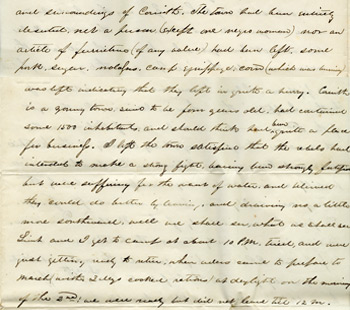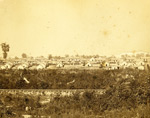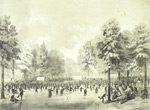Click Center Image for Full Size Picture
Major General Henry Halleck arrived at Pittsburg Landing, Tennessee, on April 11, 1862. As head of the Department of Mississippi, he commanded both Grant's Army of the Tennessee and Buell's Army of the Ohio. Along with the Army of the Mississippi, they formed the newly established "Grand Army of the Tennessee." Halleck planned to use his Grand Army with over 100,000 men in a campaign to capture strategic cities and railroad junctions in the South. His first target was the railroad junctions at Corinth, Mississippi, defended by Confederate General P. G. T. Beauregard.
The Grand Army began a deliberate march towards the Confederate Army twenty-five miles away, constructing ample defenses along the route-they were an army determined not to be taken by surprise again. The First Battle of Corinth would derisively be remembered as the "Siege of Corinth" because of Halleck's slow pace.
Beauregard, fully aware of Halleck's advance, had plenty of time to choose his strategy. Confederate leaders wanted the Memphis & Charleston Railroad junction held, but Beauregard saw little point in it when Memphis was poised to fall to Union troops. He determined to hold Corinth until the odds were too high, and then evacuate his soldiers to hold the more useful Mobile & Ohio Railroad. As he waited, Beauregard was frustrated by the Union's slow approach, watching as Confederate morale sank and sickness claimed the lives of almost as many men as he had lost at Shiloh.
When the Union Grand Army finally reached Corinth, Beauregard enacted his plan. He allowed false information about a Confederate advance to leak to the cautious Halleck. The sick and wounded of Beauregard's army were evacuated by train, along with their heavy equipment. Throughout the night, he kept the empty trains running, with orders to stop at certain points where Confederate soldiers loudly greeted the arrival of "reinforcements." Campfires burned and drummers beat reveille at the regular hours, but the soldiers had already moved out. Beauregard's soldiers even mounted fake siege guns manned by stuffed mannequins. When the Union entered Corinth on May 30, 1862, they found an empty town.
Cheney's reaction mirrored that of his commanders. He wrote to Mary on June 5, 1862, "We have let them slip through our fingers."






